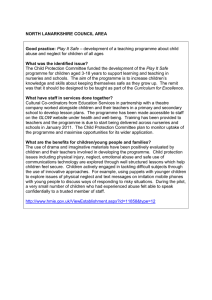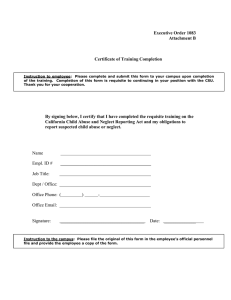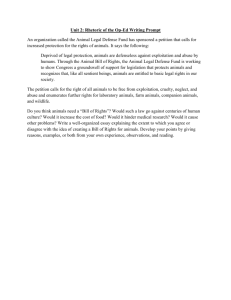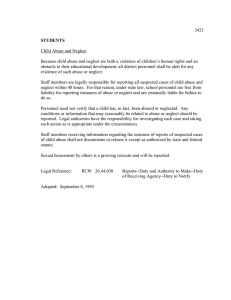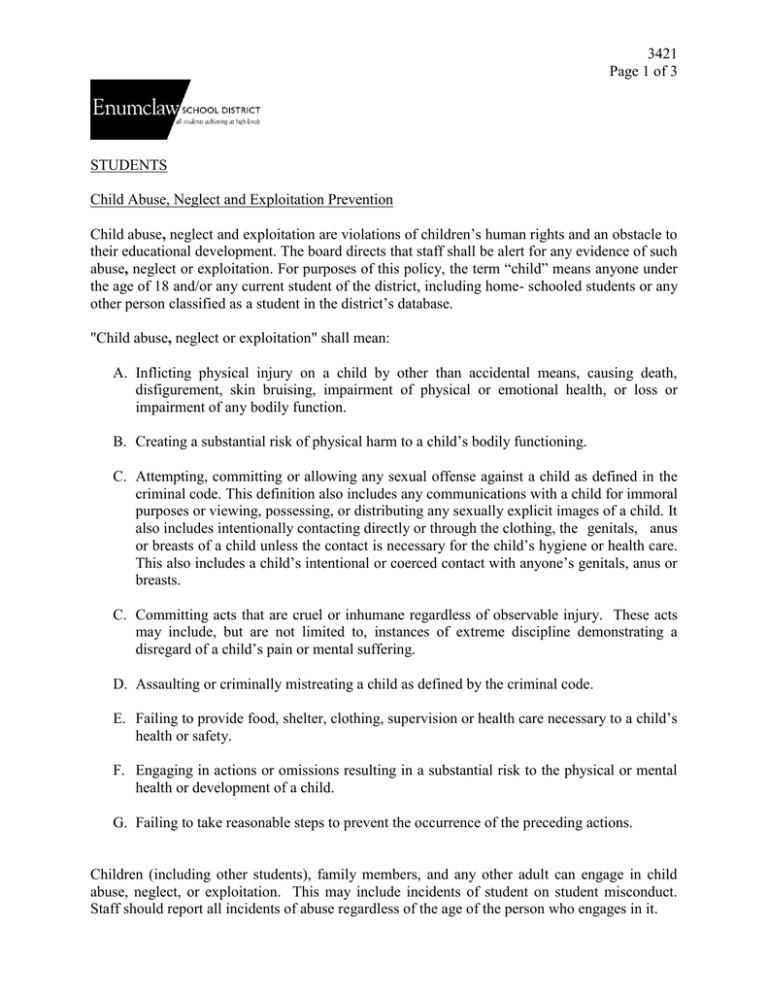
3421
Page 1 of 3
STUDENTS
Child Abuse, Neglect and Exploitation Prevention
Child abuse, neglect and exploitation are violations of children’s human rights and an obstacle to
their educational development. The board directs that staff shall be alert for any evidence of such
abuse, neglect or exploitation. For purposes of this policy, the term “child” means anyone under
the age of 18 and/or any current student of the district, including home- schooled students or any
other person classified as a student in the district’s database.
"Child abuse, neglect or exploitation" shall mean:
A. Inflicting physical injury on a child by other than accidental means, causing death,
disfigurement, skin bruising, impairment of physical or emotional health, or loss or
impairment of any bodily function.
B. Creating a substantial risk of physical harm to a child’s bodily functioning.
C. Attempting, committing or allowing any sexual offense against a child as defined in the
criminal code. This definition also includes any communications with a child for immoral
purposes or viewing, possessing, or distributing any sexually explicit images of a child. It
also includes intentionally contacting directly or through the clothing, the genitals, anus
or breasts of a child unless the contact is necessary for the child’s hygiene or health care.
This also includes a child’s intentional or coerced contact with anyone’s genitals, anus or
breasts.
C. Committing acts that are cruel or inhumane regardless of observable injury. These acts
may include, but are not limited to, instances of extreme discipline demonstrating a
disregard of a child’s pain or mental suffering.
D. Assaulting or criminally mistreating a child as defined by the criminal code.
E. Failing to provide food, shelter, clothing, supervision or health care necessary to a child’s
health or safety.
F. Engaging in actions or omissions resulting in a substantial risk to the physical or mental
health or development of a child.
G. Failing to take reasonable steps to prevent the occurrence of the preceding actions.
Children (including other students), family members, and any other adult can engage in child
abuse, neglect, or exploitation. This may include incidents of student on student misconduct.
Staff should report all incidents of abuse regardless of the age of the person who engages in it.
3421
Page 2 of 3
Subject to the definition above, staff should not focus on a person’s mental status to determine if
she or he has committed child abuse, neglect, or exploitation. The law governing mandated
reporting does not allow for exceptions for people with medical conditions that may mitigate the
intent for committing child abuse, neglect, or exploitation.
When feasible, the district will provide community education programs for prospective parents,
foster parents and adoptive parents on parenting skills and on the problems of child abuse and
methods to avoid child abuse situations. The district shall also encourage staff to participate in
in-service programs that address the issues surrounding child abuse.
The superintendent, or his/her designee, shall develop reporting procedures and provide them to
all staff on an annual basis. The purpose is to identify and timely report all evidence of child
abuse neglect, or exploitation to the proper authorities. Staff shall receive training regarding
reporting obligations during their initial orientation and every three years after initial
employment.
All
All staff are responsible for reporting all suspected cases of child abuse, neglect, and exploitation
to the proper authorities and/or the appropriate school administrator. Under state law, staff are
free from liability for reporting a reasonable suspicion of child abuse, neglect, or exploitation.
However, failing to report the incident may result in criminal liability regardless of whether the
authorities determine the incident is provable in a subsequent legal proceeding.
Staff need not verify a report that a child has been abused, or exploited. Any conditions or
information that may be reasonably related to child abuse, neglect, or exploitation should be
reported. Legal authorities have the responsibility for investigating each case and taking
appropriate action under the circumstances.
Cross References:
Policy 3226
Policy 4310
Legal References:
RCW 13.34.300
26.44.020
26.44.030
Interviews and Interrogations of Students on
School Premises
Relations with the Law Enforcement, Child
Protective Agencies and the County
Health Department
Failure to cause juvenile to attend school as
evidence under neglect petition
Child abuse--Definitions
Reports – Duty and authority to make –
Duty of receiving agency – Duty to
notify – Case planning and
consultation – Penalty for
unauthorized exchange of
information – Filing dependency
petitions – Interview of children –
Records – Risk assessment Process
28A.320.160
Alleged sexual misconduct by school
employee—Parental notification—
Information on public records act.
3421
Page 3 of 3
28A.400.317
Physical abuse or sexual misconduct by
school
employees—Duty
to
Report—Training
Community education provisions-- Purposes
Community education provisions—Restrictions
Background checks--Access to children or
vulnerable persons
28A.620.010
28A.620.020
43.43.830(6)
Adoption Date:
Updated:
Updated:
Updated:
WAC 388-15-009
Definition of child abuse, neglect or
exploitation
AGO 1987, No. 9
Children—Child Abuse—Reporting by
School Officials—Alleged Abuse by
Student
February 21, 1989
November 19, 2001
October, 2007
May, 2010
Updated:
Updated:
February, 2014
August, 2015


